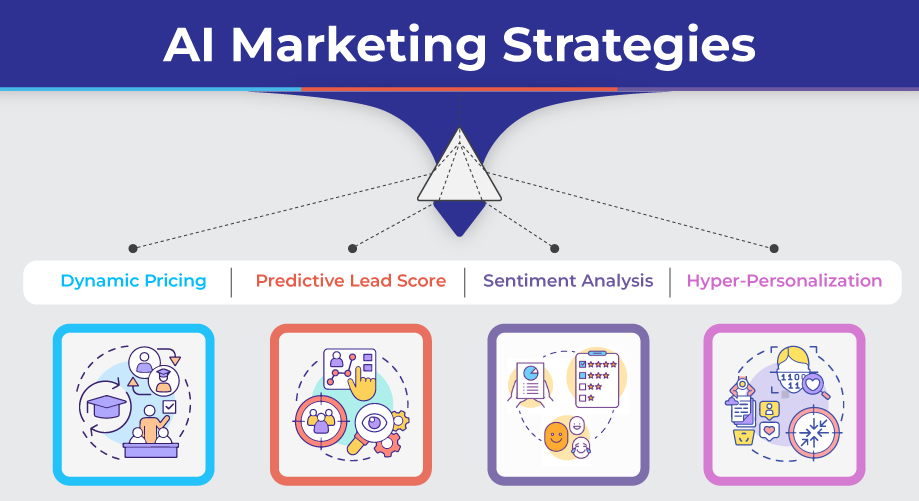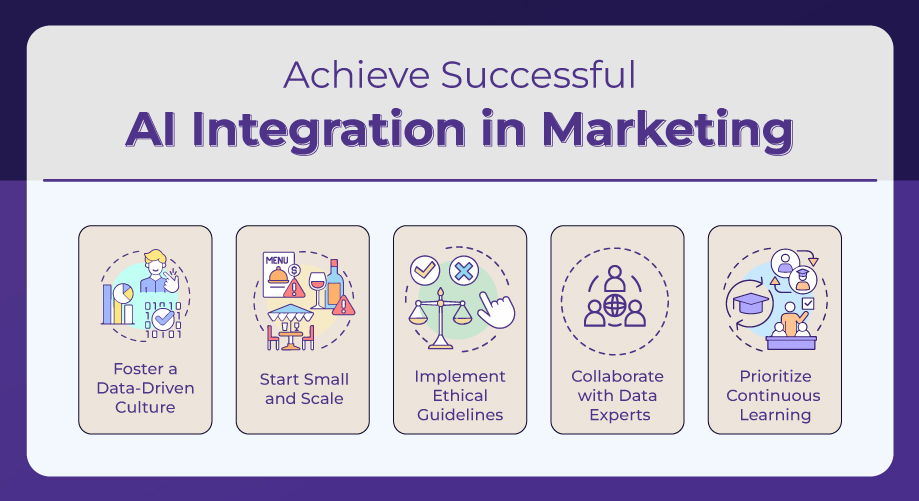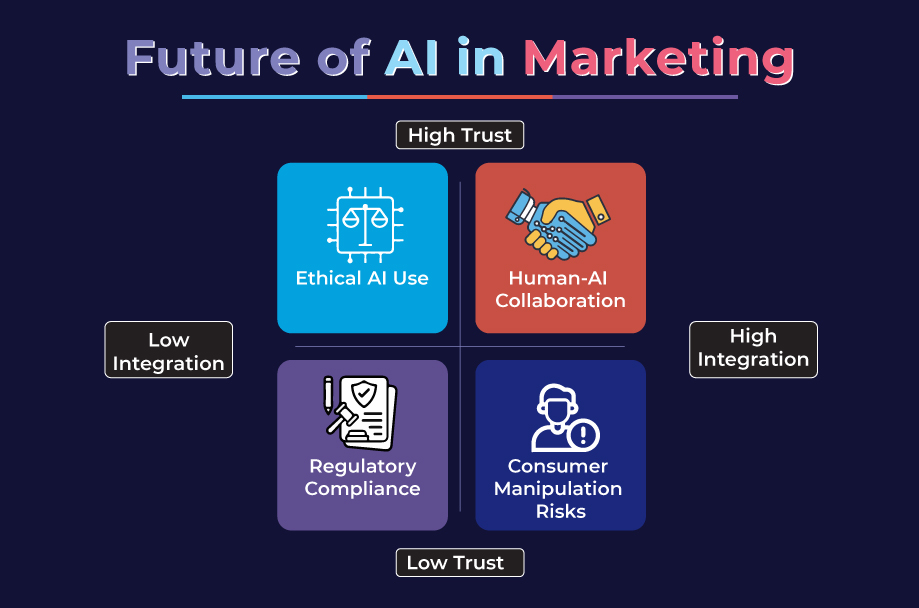AI for Data-Driven Marketing: Key Takeaways, Trends, and Adoption
As the digital landscape continues to evolve, AI in Data Driven Marketing has emerged as a transformative force, allowing businesses to make smarter, data-driven decisions. From audience segmentation to real-time personalization, AI is redefining the way marketers engage with customers. This article delves deeper into the trends, challenges, and opportunities associated with AI in marketing and offers insights into its future role in shaping the industry.


Expanding on Trends and Adoption
The integration of AI in Data Driven Marketing is no longer a distant goal—it’s becoming mainstream, with 35% of professionals already utilizing AI in some form and an additional 8% planning to adopt it soon. Let’s explore the current trends and dive deeper into how AI is reshaping various industries.
Industry-Specific Examples
- Retail: AI-powered recommendation engines are enhancing personalization by suggesting products based on customer behavior and preferences. This not only improves the shopping experience but also boosts sales and customer retention.
- Finance: In the financial sector, AI is automating fraud detection and improving customer experiences by providing personalized financial advice.
- Healthcare: AI in healthcare marketing helps target patients with tailored content, while predictive analytics enables hospitals to optimize resource allocation and improve patient outcomes.
Emerging Trends
- Generative AI: Newer forms of AI, such as generative AI, are revolutionizing content creation. From generating unique ad copy to designing product images, generative AI allows marketers to automate creative tasks, producing more personalized and engaging content.
- Global Adoption Rates: While AI adoption is growing worldwide, the pace differs across regions. North America and Europe are leading the charge, with high levels of investment in AI-powered marketing tools. Meanwhile, adoption is slower in emerging markets like Southeast Asia and Africa due to limited infrastructure and higher costs.
Challenges and Opportunities
While AI promises significant benefits, it also presents challenges that marketers must navigate carefully.
Data Bias and Mitigation
One of the biggest challenges with AI in Data Driven Marketing is data bias. Biased data can result in skewed AI models, leading to unfair or discriminatory outcomes in marketing. For example, biased algorithms may exclude certain demographics or show unequal representation in ads. To mitigate this, marketers should audit datasets for bias and implement safeguards to ensure fairness.
Explainability and Trust
AI models can often function as “black boxes,” making decisions without easily explainable logic. This raises concerns about transparency and trust. Explainable AI (XAI) is crucial as it provides insight into how AI models arrive at decisions, fostering trust and ensuring ethical use of AI. Marketers need to work with data scientists to implement transparent AI systems, especially when customer data is involved.
Measurement and Attribution
AI can greatly enhance marketers’ ability to measure campaign performance and attribute results to specific efforts. Traditional marketing often struggles with attribution, but AI tools can analyze complex customer journeys, providing clearer insights into which touchpoints drive conversions.
Tips for Successful AI Implementation
To fully unlock AI’s potential in Data Driven Marketing, marketers must approach its implementation strategically. Here are some tips to ensure AI success:
- Cultural Change: AI adoption goes beyond just technology. It requires a cultural shift within organizations, fostering a data-driven mindset. Encourage experimentation, collaboration between teams, and continuous upskilling to integrate AI into daily operations.
- Start Small and Scale: Begin by applying AI to a single, specific use case, such as personalized email campaigns or chatbot integration. Once successful, expand AI applications to other areas like customer segmentation and predictive analytics.
- Ethical Guidelines: Marketers must develop and adhere to ethical AI practices. This includes avoiding discriminatory targeting, ensuring fairness in advertising, and protecting user privacy. Establish clear ethical guidelines to prevent unintended consequences and comply with regulations.
- Collaborate with Data Experts: Work closely with data scientists and IT teams to ensure you’re making the most of AI’s potential. Their technical expertise is essential for developing robust AI models and solving complex problems like data quality and bias.
- Continuous Learning: AI is an evolving technology, and staying updated is key. Ensure that your marketing teams are continuously learning and adapting to new AI advancements to remain competitive.
Specific Examples of AI Applications in Marketing


AI can be leveraged across numerous areas in marketing, helping businesses improve efficiency, precision, and engagement.
- Dynamic Pricing: AI algorithms can adjust prices in real time based on factors like demand, competition, and customer behavior, maximizing revenue and ensuring competitive pricing strategies.
- Predictive Lead Scoring: AI helps sales teams focus on the most promising leads by analyzing past behaviors and characteristics to predict conversion probability. This allows for more efficient allocation of resources and better-targeted follow-ups.
- Sentiment Analysis: By using AI-driven sentiment analysis, marketers can understand customer emotions and perceptions in real-time. This helps brands refine messaging and address issues proactively, improving overall brand reputation.
- Personalization: One of the most powerful applications of AI in Data Driven Marketing is hyper-personalization. By analyzing user behavior and preferences, AI can tailor content, recommendations, and offers to individual customers, creating more meaningful and engaging interactions.
Future Outlook: AI’s Growing Role in Marketing


As AI continues to evolve, it will play an increasingly important role in shaping the future of marketing. However, it’s important to consider both the opportunities and challenges that lie ahead.
Ethical Considerations and Consumer Trust
One of the key future challenges is ensuring that AI is used responsibly. As AI becomes more advanced, concerns around manipulating consumer behavior will grow. Marketers must focus on creating AI strategies that enhance user experiences without exploiting their data or preferences.
Regulatory Landscape
The regulatory environment around AI is tightening, with regulations like GDPR and CCPA already influencing data collection practices. As AI adoption increases, these regulations will likely evolve, requiring marketers to stay ahead of compliance requirements.
Human-AI Collaboration
Contrary to fears that AI will replace humans, the future of AI in marketing lies in human-AI collaboration. AI will augment human capabilities by handling data-heavy tasks like audience segmentation and personalized recommendations, allowing marketers to focus on creative and strategic aspects.
Conclusion
AI in Data Driven Marketing is no longer a futuristic concept—it’s here, and it’s transforming how marketers engage with their audiences. By adopting AI technologies, businesses can make smarter, data-driven decisions, improve customer experiences, and stay ahead of the competition. However, AI’s implementation must be approached with caution, taking into account challenges like data bias, explainability, and ethics.
The future of marketing is AI-driven, and those who embrace its potential, continuously learn, and collaborate with data experts will be at the forefront of this exciting transformation.







